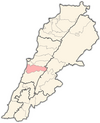Bhamdoun: Difference between revisions
No edit summary |
No edit summary |
||
| Line 130: | Line 130: | ||
Before the [[Lebanese civil war]], Bhamdoun was one of Lebanon's most renowned and favorite summer resorts. Today, the town has regained some of its past touristic industry as most of its hotels, restaurants and entertainment centers have been renovated or rebuilt. Tourists, especially from the [[Persian Gulf|Gulf region]] who once knew Bhamdoun, are returning to spend their [[summer vacation]] there. Many have also purchased houses or built their own. |
Before the [[Lebanese civil war]], Bhamdoun was one of Lebanon's most renowned and favorite summer resorts. Today, the town has regained some of its past touristic industry as most of its hotels, restaurants and entertainment centers have been renovated or rebuilt. Tourists, especially from the [[Persian Gulf|Gulf region]] who once knew Bhamdoun, are returning to spend their [[summer vacation]] there. Many have also purchased houses or built their own. |
||
It has five [[Church (building)|churches]], three [[mosque]]s and one [[synagogue]]. There are two Greek Orthodox churches, one [[Maronite]], one [[Protestant]], and one [[Catholic]]. During the civil war, all five churches were destroyed by the [[Druze]] militia of [[Walid Jumblatt|Jumblatt]]'s [[Progressive Socialist Party]], but they have since been rebuilt. The synagogue, one of three |
It has five [[Church (building)|churches]], three [[mosque]]s and one [[synagogue]]. There are two Greek Orthodox churches, one [[Maronite]], one [[Protestant]], and one [[Catholic]]. During the civil war, all five churches were destroyed by the [[Druze]] militia of [[Walid Jumblatt|Jumblatt]]'s [[Progressive Socialist Party]], but they have since been rebuilt. |
||
The synagogue, built in 1910<ref>Parfitt, Tudor, ''Israel and Ishmael: Studies in Muslim-Jewish relations'', Page 89, St. Martin's Press 2000</ref>, was one of three grand synagogues in Lebanon. It was abandoned shortly before the civil war, but the shell of the structure still stands [http://www.flickr.com/photos/nat_muller/3870651190/][http://www.flickr.com/photos/nat_muller/3869869733/in/photostream/]. |
|||
In 2000, a winery called Chateau Belle-Vue began planting vines, creating jobs in the village. It began producing wine in 2003. <ref>www.chateaubelle-vue.com</ref> |
In 2000, a winery called Chateau Belle-Vue began planting vines, creating jobs in the village. It began producing wine in 2003. <ref>www.chateaubelle-vue.com</ref> |
||
Revision as of 04:01, 5 September 2010
Bhamdoun
بحمدون | |
|---|---|
| Country | |
| Governorate | Mount Lebanon Governorate |
| District | Aley District |
| Time zone | UTC+2 (EET) |
| • Summer (DST) | +3 |
Bhamdoun (Arabic: بحمدون) is a town in Lebanon Template:Km to mi from Beirut on the main road that leads to Damascus, lying at an altitude of Template:M to ft above the Lamartine valley. Two separate villages compose the town, Bhamdoun-el-mhatta (literally meaning "Bhamdoun the station") and Bhamdoun-el-day'aa ("Bhmadoun the village"). A railroad used to link Bhamdoun to Beirut with the train station being a prominent feature of the town for many years. The station and railroad were eventually abandoned when cars became more popular. The population is mostly Orthodox Christian.
Before the Lebanese civil war, Bhamdoun was one of Lebanon's most renowned and favorite summer resorts. Today, the town has regained some of its past touristic industry as most of its hotels, restaurants and entertainment centers have been renovated or rebuilt. Tourists, especially from the Gulf region who once knew Bhamdoun, are returning to spend their summer vacation there. Many have also purchased houses or built their own.
It has five churches, three mosques and one synagogue. There are two Greek Orthodox churches, one Maronite, one Protestant, and one Catholic. During the civil war, all five churches were destroyed by the Druze militia of Jumblatt's Progressive Socialist Party, but they have since been rebuilt.
The synagogue, built in 1910[1], was one of three grand synagogues in Lebanon. It was abandoned shortly before the civil war, but the shell of the structure still stands [1][2].
In 2000, a winery called Chateau Belle-Vue began planting vines, creating jobs in the village. It began producing wine in 2003. [2]
[www.chateaubelle-vue.com]

